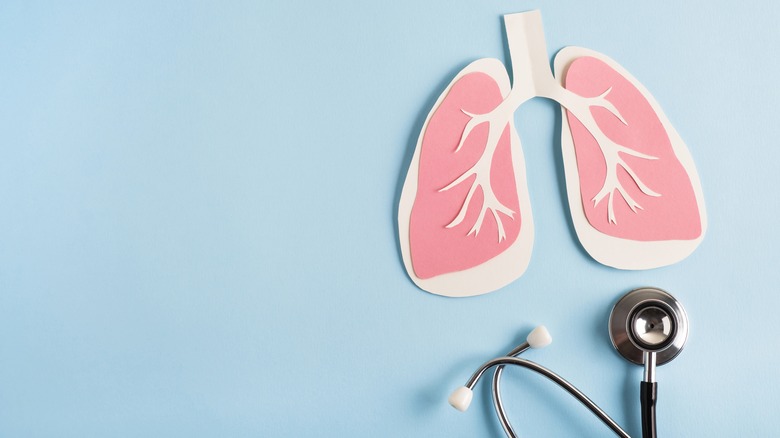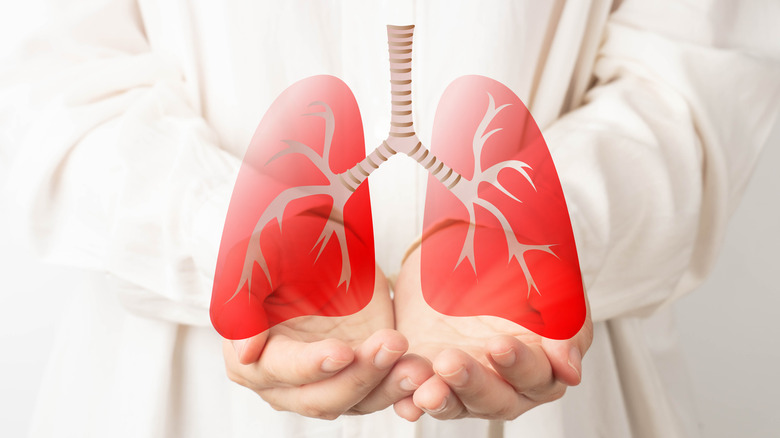How Is Emphysema Treated?
According to the American Lung Association, about 3 million Americans have been diagnosed with emphysema. This progressive respiratory condition causes the lungs to lose their natural elasticity and ability to absorb oxygen and release carbon dioxide (via Harvard Medical School). The condition mainly affects the air sacs (alveoli) and bronchioles, with shortness of breath being the most predominant symptom of emphysema, according to the American College of Chest Physicians. The American Lung Association notes that the symptoms may take years to develop and usually include cough, wheezing, shortness of breath, and chest tightness.
It's also one of two components of chronic obstructive pulmonary disease (COPD) and is characterized by airflow blockage and breathing difficulties, per the British Lung Foundation. The Centers for Disease Control and Prevention estimates that more than 15 million Americans have COPD, with about 150,000 deaths reported every year.
According to WebMD, your doctor might diagnose emphysema by physically examining your body and assessing your medical history. However, a chest X-Ray, CT scan, pulmonary function test, and other lab tests might be needed to help diagnose advanced emphysema.
Diagnosis and treatment options for emphysema
According to the American Lung Association, there's no cure for emphysema, but various treatment options exist to manage emphysema symptoms. Depending on the results, you can manage the condition with bronchodilator or anti-inflammatory medications, non-surgical endobronchial valve placement, lung volume reduction surgery, or lung transplantation. Your doctor might also recommend oxygen therapy to improve oxygen levels and reduce emphysema symptoms like breathlessness and fatigue (via Medical News Today).
According to Asthma+Lung UK, lung volume reduction surgery is an effective treatment for people with emphysema. It works by reducing the amount of air trapped in the lungs alleviating breathlessness and fatigue. However, the foundation notes that the surgery is only effective for emphysema. It's not appropriate if also you have other lung conditions like asthma, bronchiectasis, or pulmonary fibrosis.
A 2008 study published in the journal American Thoracic Society also reveals the importance of pulmonary rehabilitation when treating emphysema. This therapy involves less reliance on medical equipment with more focus on exercise tolerance. The study emphasizes the effectiveness of pulmonary rehabilitation in patients with advanced emphysema. It helps alleviate emphysema symptoms, optimize functional control, and improve patients' independence as they battle with the condition. This therapy helps lessen the medical and economic burden of emphysema, per the study.
Besides medications and clinical treatments, certain lifestyle habits might help symptoms. According to Healthline, quitting smoking, avoiding infections, managing stress, exercising frequently, and maintaining a healthy diet might help minimize your vulnerability to more severe symptoms.
Causes of emphysema
According to Medline Plus, emphysema arises from long-term exposure to irritants causing damage to the lungs and airways. Airborne irritants are environmental substances that adversely affect the lungs and other internal organs when you inhale them (via Medical News Today). The source indicates that airborne irritants can also worsen respiratory conditions like emphysema and COPD.
Smoking is the leading cause of emphysema and leads to over 480,000 deaths in the U.S. every year, as stated by Healthline. The source adds that COPD accounts for 80% of those deaths. However, the relationship between smoking and emphysema isn't straightforward, given that secondhand smokers are just as vulnerable as direct smokers. The National Emphysema Foundation has established that children exposed to secondhand smoke face a higher risk of developing early emphysema even if they become non-smoking adults.
Other emphysema-causing irritants include chemical fumes and dust at work, according to the National Emphysema Foundation.
Apart from smoking and other airborne irritants, there may be other causes of emphysema. For instance, even though it's rare, emphysema can also be hereditary and is linked to a rare form of the disease known as alpha 1-antitrypsin (AAT) deficiency (via Johns Hopkins Medicine). A 2011 study published in the journal American Thoracic Society also reveals a significant relationship between infection with HIV (human immunodeficiency virus) and emphysema. The source indicates emphysema can happen in both HIV-infected smokers and non-smokers. The study authors note, however, much remains to be learned about HIV-associated COPD.



